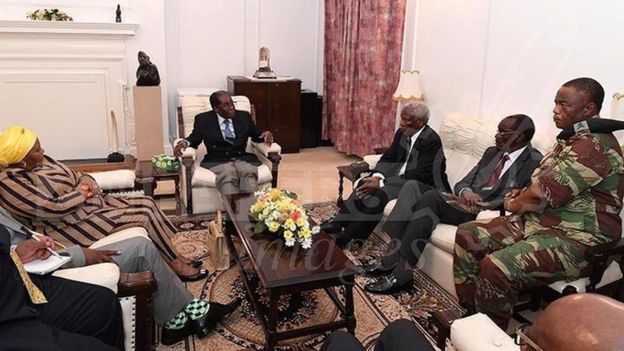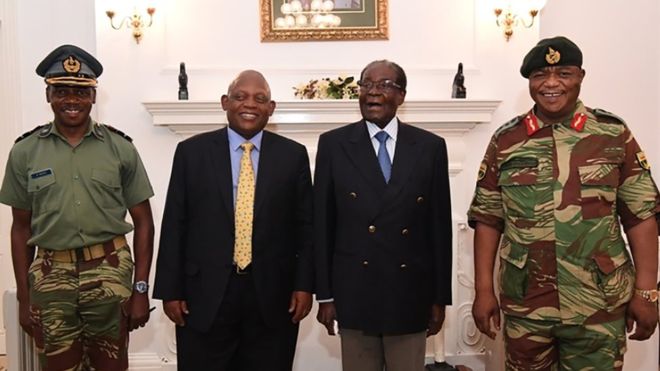Zimbabwe’s long-time President Robert Mugabe is reportedly refusing to step down immediately, despite growing calls for his resignation.
The 93-year-old was put under house arrest during a military takeover on Wednesday, amid a power struggle over who would succeed him.
The military said on Friday it was “engaging” with Mr Mugabe.
It also said progress had been made in targeting “criminals” around the president, but did not elaborate.
Several senior officials are said to have been detained since Wednesday.
In a televised statement, the military said it would advise the nation on the outcome of talks with Mr Mugabe “as soon as possible”.
President Mugabe held talks on Thursday with regional envoys and the army chief. Sources say he has so far refused to agree to move aside.
Opposition leader Morgan Tsvangirai said earlier it was “in the interests of the people” that Mr Mugabe “resign… immediately”.

The army moved in after Mr Mugabe last week sacked Vice-President Emmerson Mnangagwa, signalling that he favoured his wife Grace Mugabe to take over his Zanu-PF party and thus the presidency.
The BBC’s Andrew Harding, in Zimbabwe, says that if President Mugabe can be persuaded to step down officially it could help legitimise the military’s dramatic intervention.
On the streets, it is hard to find anyone who wants Mr Mugabe to stay on, our correspondent adds, but negotiating the manner of his departure and some sort of transitional agreement to follow could take some time.
It is very unclear.
Photos in the Zimbabwe Herald earlier showed Mr Mugabe meeting army chief Gen Constantino Chiwenga and the two envoys from the Southern African Development Community (Sadc) at State House in Harare.
Alongside them was Father Fidelis Mukonori, a Roman Catholic priest known to Mr Mugabe for years, who has been brought in to mediate.
Sources close to the talks say Mr Mugabe – who has been in control of Zimbabwe since it threw off white minority rule in 1980 – is refusing to stand down voluntarily before next year’s planned elections.
“I think he is trying to buy time,” one source close to the army leadership told the AFP news agency.
Some observers suggest that Mr Mugabe may be trying to seek guarantees of safety for himself and his family before stepping aside.
Zanu-PF officials had earlier suggested Mr Mugabe could remain nominally in power until the party congress in December, when Mr Mnangagwa would be formally installed as party and national leader.
How did the military takeover come about?
In the early hours of Wednesday, Zimbabwe’s military took over the headquarters of national broadcaster ZBC and issued a statement saying they were targeting “criminals” around President Mugabe.
Troops and armoured vehicles encircled parliament and other key buildings throughout the day.
On Monday, Gen Chiwenga had warned the army would intervene to end what he called the “purging” of Zanu-PF members “with a liberation background”, referring to the country’s struggle for independence.
Mr Mnangagwa is one such veteran of the 1970s war which led to independence.
–
Source: BBC


